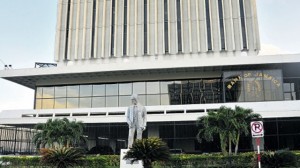 Higher electricity, gas prices to come Jamaicans should brace for higher electricity bills and prices at the pump due to political unrest in oil-rich nations, according to the Bank of Jamaica (BOJ).
Higher electricity, gas prices to come Jamaicans should brace for higher electricity bills and prices at the pump due to political unrest in oil-rich nations, according to the Bank of Jamaica (BOJ).
It signals increased costs for businesses and consumers already affected by a double-digit currency depreciation.
“Domestic energy costs are expected to increase in response to higher West Texas Intermediate (WTI) prices forecast over the remainder of the fiscal year,” said the BOJ in its Quarterly Monetary Policy Report published on Monday.
This increase is separate from the expected “impact” of a tariff rate adjustment assumed for the September 2014 quarter, added the report.
The light and power utility company Jamaica Public Service (JPS) earlier this year applied to its regulator for a non-fuel tariff increase which could result in its customers paying an average 21 per cent increase for electricity.
“The rise in oil prices primarily resulted from the impact of geopolitical tensions between Ukraine and Russia, the latter being one of the world’s leading energy exporters,” stated the report.
The BOJ did not specify the expected rise going forward. It did, however, indicate that average WTI fuel prices a measure from which the island gauges the cost of oil increased by 9.3 per cent to US$102.98 a barrel in the June quarter. In addition, the report mentioned the impact on oil supplies with respect to the escalating violence in Iraq and the prospect of a return to civil war.
The rising cost of fuel and increases in bus fare announced last week puts the Government’s single-digit inflation target between “seven to nine per cent over the next four quarters” under pressure.
“The BOJ perceives inflationary risks to be skewed to the upside over the coming quarters,” said the BOJ report. “Upside risks include the potential for weather conditions to be more severe than currently anticipated.”
Escalated tensions in the Middle East may also lead to a rise in international crude oil prices substantially above current forecasts.
“A higher-than-projected adjustment to tariff rates on electricity bills is considered an upside risk, as well as the possibility that imported agriculture commodity prices may exceed current projections,” said the BOJ. “Other upside risks include the potential for a stronger- than-anticipated pass-through from exchange rate depreciation and the possibility that high inflation expectations will persist among Jamaican businesses.”
The island’s medium-term policy is influenced by its International Monetary Fund (IMF) loan agreement. Since the start of the programme last year total disbursements under the IMF’s extended fund facility to end-June 2014 amounted to some US$414.4 million.
“The main policy challenge for the Bank over the near term is the elevated inflation expectations. If the economy continues on the projected favourable path, then there should be a downward adjustment in inflation expectations consistent with the Bank’s projections,” stated the BOJ. “Such an adjustment in expectations would create the conditions for further easing of monetary policy.”
